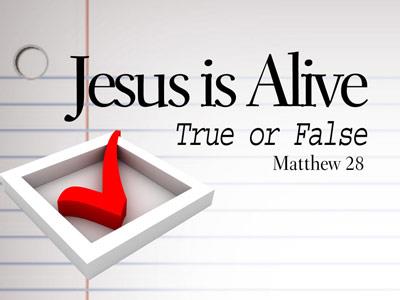-
The Uniqueness Of Jesus Series
Contributed by Richard White on Nov 28, 2017 (message contributor)
Summary: What is it about Christianity that makes it so exclusive? Is Jesus really so unique? This series discovers the claims of Christianity and Jesus.
The Uniqueness of Jesus Christ
John 1:29-42
This series will help us to see the unique nature of Jesus and the exclusiveness of Christianity. The first discovery comes from John’s statement about Jesus.
A tourist visited a church in Germany and was surprised to see the carved figure of a lamb near the top of the church’s tower. He asked why it was there and was told that when the church was being built, a workman fell from a high scaffold. His co-workers rushed down, expecting to find him dead. But to their surprise and joy, he was alive and only slightly injured.
How did he survive? A flock of sheep was passing beneath the tower at the time, and he landed on top of a lamb. The lamb broke his fall and was crushed to death, but the man was saved.
To commemorate that miraculous escape, someone carved a lamb on the tower at the exact height from which the workman fell.
In this passage, John the Baptist calls Jesus “The Lamb of God.”
What does that mean for us? For us today it might not have much meaning, but for first Century Jews it has great significance. This was a Messianic proclamation.
About 1500 B.C. the first “Passover Lamb” was sacrificed. It followed the command of the Lord that the blood of a spotless lamb was to be placed on the door frame. Each house that had the blood of the Lamb on the doorpost, the Lord passed over.
One commentator made this statement:
“In every household in Egypt that night, there was either a dead lamb or a dead firstborn.”
To commemorate this moment, Jews were to celebrate Passover each Spring. A one year old lamb without spot or blemish was to be sacrificed. Indeed, John the Baptist called Jesus the "Lamb of God, who takes away the sin of the world" (John 1:29), just as the Last Supper was a celebration of the Passover meal. The Passover lamb, whose blood was applied to the doors of Israelite homes, (1) averted harm to that house, (2) provided a substitute that allowed the firstborn to live (12:13), and (3) propitiated the wrath of God so that the angel of death passed over the protected homes.
The lamb or kid to be slaughtered by each family is called (by the figure of speech known as metonymy: the exchange of one noun for a related noun) "the Passover" (happasah) itself (the NIV attempts to aid the reader by rendering it "the Passover lamb," v. 21). Blood from this animal was placed in a basin and with "a bunch of hyssop" (v. 22, see Notes) was "slapped" (the verb ng` is cognate with one of the words for "plague," nega` in 11:1) on the doorframe. Israel would know the grounds and means of their deliverance and redemption: a sacrificed substitute and the blood of atonement in which the paschal animal died in place of the firstborn of all who took shelter from the stroke of the destroyer.
The Passover lamb was to be a male of the first year (first fruit) without blemish or spot, sacrificed according to God's specific instructions. Obedience to the instructions of the Lord regarding the sacrificial blood of the Passover lamb brought deliverance from the wages of sin and death for those within the house (Exodus 12). The lamb died in their place that they might be saved.
This Lamb died continually. The Passover was celebrated and still is today. The sacrificing of this Lamb was to cover over sins. Jesus Christ is “THE LAMB OF GOD, WHO TAKES AWAY THE SINS OF THE WORLD.”
Jesus is the Lamb who removes the sin as though it were never committed. The only reason He could do that is because He is GOD.
Lambing: A shepherd tells of how they get an orphaned lamb to be adopted. Two ewes gave birth, one ewe died giving birth while the other gave birth to a stillborn lamb. The ewe that survived would not accept the surving orphaned lamb. The shepherds would take the wool off the dead lamb and cover the orphaned lamb with that wool. The surviving ewe would smell the wool and accept the orphaned lamb as her own. Even after she has realized it is not really hers.
So it is with God, covered in the blood of the Lamb of God, the Father does not see us, he sees His Son, Jesus, and by coming in contact with or being covered with His blood, we are forgiven and adopted into the Family of God.
Other religions tell us to do things to earn our way to heaven or whatever place they are attaining toward. Jesus says "I did it for you." Only in Christianity is everything done for us to save us. We do not work to get saved, we do not work to earn forgiveness, we work because we are saved and we are forgiven. The Lamb of God took our sins away.

 Sermon Central
Sermon Central



